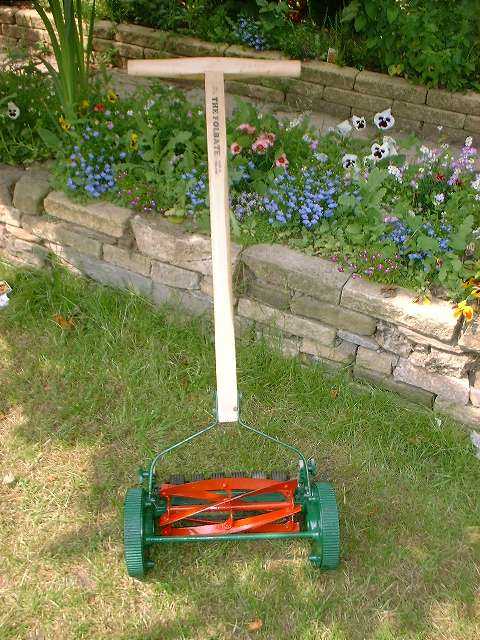The Folbate Model J2

Links
Brill
Comfort & Luxus
at the green warehouse
'So light even your granny could use one'
Our Parent Site
Follows & Bate
|
The Folbate Model J2 |
 |
Links Brill
Comfort & Luxus 'So light even your granny could use one'
Our Parent Site |
Follows & Bate of Gorton, Manchester, England is one of the most famous of the early British lawn mower manufacturers. The company was started in 1868 by Frederick William Follows who saw the potential for a small, mass produced lawn mower for the domestic market.
The Climax model that was introduced by the company in 1869 was the worlds first side wheel mower.
A number of other successful models followed and in the early 1890s Follows & Bate introduced the Speedwell range of side wheel mowers that were, according to the company, "fitted with the latest improvements". The company had by this time a formidable reputation for producing high quality machines that could be sold at an affordable price.
The Speedwell was like many similar sidewheel models of the period: cast iron side frames and wheels connected by a bar and the cutting plate. The cutting cylinder (or reel) was driven by ratchets inside the wheels. The mower was available in sizes ranging from 7in cut to 17in cut in 2in increments. A grass box could be supplied for an additional charge.
Follows & Bate was clearly proud of its successful mower and proclaimed in its advertisements that the Speedwell was "The cheapest serviceable machine on the market" and "much superior to the many worthless imitations from abroad that are thrown on the market for sales".
Follows & Bate continued to manufacture a wide range of machines until it was taken over by Qualcast in 1938. Inexpensive mowers with the 'Folbate' name were produced by Qualcast until 1966, the mower above is a 'Qualcast' Folbate model J2.
The advent of low-cost petrol and electric mowers has badly affected sales of hand mowers within the UK and Europe to such a point that it is virtually impossible to obtain quality new ones within the UK unlike the states where 'Reel' (sidewheel) mowers have remained popular and readily available. Ironically these new mowers are a world away from heavy cast iron push mowers of yesteryear, the lightweight mowers available today are ideal for the small 'postage stamp' lawns typically found in UK gardens. Put bluntly by the time you've dragged a petrol or electric mower from the shed filled it with petrol or uncoiled the flex and started it up you could have been more than half way through cutting your lawn with a hand mower. Add in the fact that there is virtually nothing to break, no risk of electric shocks, petrol fires, no fumes and little noise as well as being able to leave it out in the rain with no adverse effects and you have quite an amazingly overlooked little package.
Check out the link above to our friends at the green warehouse who are now marketing Brill mowers, arguably the 'Rolls Royce of hand mowers' within the UK as ECO Mowers.